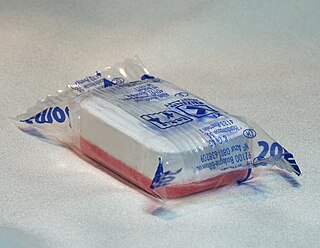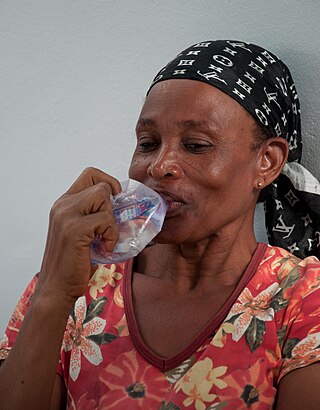
Accra is the capital and largest city of Ghana, located on the southern coast at the Gulf of Guinea, which is part of the Atlantic Ocean. As of 2021 census, the Accra Metropolitan District, 20.4 km2 (7.9 sq mi), had a population of 284,124 inhabitants, and the larger Greater Accra Region, 3,245 km2 (1,253 sq mi), had a population of 5,455,692 inhabitants. In common usage, the name "Accra" often refers to the territory of the Accra Metropolitan District as it existed before 2008, when it covered 199.4 km2 (77.0 sq mi). This territory has since been split into 13 local government districts: 12 independent municipal districts and the reduced Accra Metropolitan District (20.4 km2), which is the only district within the capital to be granted city status. This territory of 199.4 km2 contained 1,782,150 inhabitants at the 2021 census, and serves as the capital of Ghana, while the district under the jurisdiction of the Accra Metropolitan Assembly proper (20.4 km2) is distinguished from the rest of the capital as the "City of Accra".

The Accra Metropolitan District is one of the 254 Metropolitan, Municipal and Districts in Ghana, and among the 26 such districts in the Greater Accra Region with a population of 284,124 as of 2021. As of March 2018, it spans an area of approximately 60 km2 (23 sq mi) and encompasses the Ablekuma South, Ashiedu Keteke, and Okaikoi South sub-metropolitan district councils.
The Green Student Council is a non-profit organisation concerning local environmental problems that was founded in August 1993, in Hong Kong, China. Members include accountants, teachers and lawyers, as well as university students. They are expected to bring the idea of environmental protection to the fields they are in.

The drinking water supply and sanitation sector in Ghana faces a number of challenges, including very limited access to sanitation, intermittent supply, high water losses, low water pressure, and pollution. Since 1994, the sector has been gradually reformed through the creation of an autonomous regulatory agency, introduction of private sector participation, decentralization of the rural supply to 138 districts and increased community participation in the management of rural water systems.

Waste are unwanted or unusable materials. Waste is any substance discarded after primary use, or is worthless, defective and of no use. A by-product, by contrast is a joint product of relatively minor economic value. A waste product may become a by-product, joint product or resource through an invention that raises a waste product's value above zero.

Agbogbloshie is a nickname of a commercial district on the Korle Lagoon of the Odaw River, near the center of Accra, Ghana's capital city in the Greater Accra region. Near the slum called "Old Fadama", the Agbogbloshie site became known as a destination for externally generated automobile and electronic scrap collected from mostly the western world. It was alleged to be at the center of a legal and illegal exportation network for the environmental dumping of electronic waste (e-waste) from industrialized nations. The Basel Action Network, a small NGO based in Seattle, has referred to Agbogbloshie as a "digital dumping ground", where they allege millions of tons of e-waste are processed each year.

Ghana Oil Company, known as GOIL, is a state-owned Ghanaian oil and gas marketing company, formed on 14 June 1960. Currently it holds the place of Ghana's top oil marketing company, and is the only indigenous owned petroleum marketing company in Ghana.

Trashy Bags Africa is a commercial venture in Accra, Ghana, which turns plastic waste into reusable shopping bags, fashion accessories, school supplies, and other products.

The Environmental Protection Agency, is an agency of Ministry of Environment, Science, Technology and Innovation, established by EPA Act 490 (1994). The agency is dedicated to improving, conserving and promoting the country’s environment and striving for environmentally sustainable development with sound, efficient resource management, taking into account social and equity issues. It oversees the implementation of the National Environment Policy. EPA Ghana's mission is to manage, protect and enhance the country’s environment and seek common solutions to global environmental problems. Its mission is to be achieved through an integrated environmental planning and management system with broad public participation, efficient implementation of appropriate programs and technical services, advice on environmental problems and effective, consistent enforcement of environmental law and regulations. EPA Ghana is a regulatory body and a catalyst for change to sound environmental stewardship.
There are various issues of waste management in Thailand, including excessive plastic use, industrial waste, among others.

A packet is a small bag or pouch, made from paper, foil, plastic film or another type of packing material, often used to contain single-use quantities of foods or consumer goods such as ketchup or shampoo. Packets are commonly opened by making a small rip or tear in part of the package, and then squeezing out the contents.
Thomas Swaniker is a leading Ghanaian entrepreneur and philanthropist. He is the founder and executive chairman of Svani Group, an automotive conglomerate, as well as a founder and Chairman of the Advisory Board of Fidelity Bank, a growing international financial institution.
The Armech Thermal Power Station (ATPS), is a planned waste powered electricity power station in Ghana, with a proposed installed capacity of 60 megawatts (80,000 hp).

Packaging waste, the part of the waste that consists of packaging and packaging material, is a major part of the total global waste, and the major part of the packaging waste consists of single-use plastic food packaging, a hallmark of throwaway culture. Notable examples for which the need for regulation was recognized early, are "containers of liquids for human consumption", i.e. plastic bottles and the like. In Europe, the Germans top the list of packaging waste producers with more than 220 kilos of packaging per capita.

Waste management in South Korea involves waste generation reduction and ensuring maximum recycling of the waste. This includes the appropriate treatment, transport, and disposal of the collected waste. South Korea's Waste Management Law was established in 1986, replacing the Environmental Protection Law (1963) and the Filth and Cleaning Law (1973). This new law aimed to reduce general waste under the waste hierarchy in South Korea. This Waste Management Law imposed a volume-based waste fee system, effective for waste produced by both household and industrial activities.
In Egypt, waste and lack of proper management of it pose serious health and environmental problems for the country and its population. There has been some governmental attempts to better the system of waste management since the 1960s but those have not proven sufficient until now. In the last 10 years focus on this issue and solutions to it has increased both from the government and civil society. Some attempts at recycling are present, and growing in the country. But these are largely informal or private actors, and government initiatives are necessary to properly manage these systems and provide them with appropriate resources.

Emmanuel Appiah born is a Ghanaian entrepreneur and Chief Executive Officer of Aireceive LLC, a technology company in Ghana. He is known to have developed an app to improve sanitation in Ghana and communicate without the use of internet.

The Sustainable Development Goals and Ghana describes how the Sustainable Development Goals are being implemented in Ghana. The SDGs are also known as the 2030 Agenda for Sustainable Development and are a set of seventeen global goals for 169 specific areas developed by the United Nations. The Sustainable Development Goals were formed in Rio de Janeiro in 2012 at the UN Conference on Sustainable Development. Its aimed to produce a set of universal goals claimed to meet the urgent environmental, economic and political problems facing the world.

Water sachets or sachet water is a common form of selling pre-filtered or sanitized water in plastic, heat sealed bags in parts of the global south, and are especially popular in Africa. Water sachets are cheaper to produce than plastic bottles, and easier to transport. In some countries, water vendors refer to sachet water as "pure water".

Ghana Youth Environmental Movement (GYEM), is a national youth-led environmental group in Ghana established in 2012, by a group of young activists led by Gideon Commey, that empowers young people to engage in a sustainable environment and address climate issues through advocacy campaigns and community activities.















